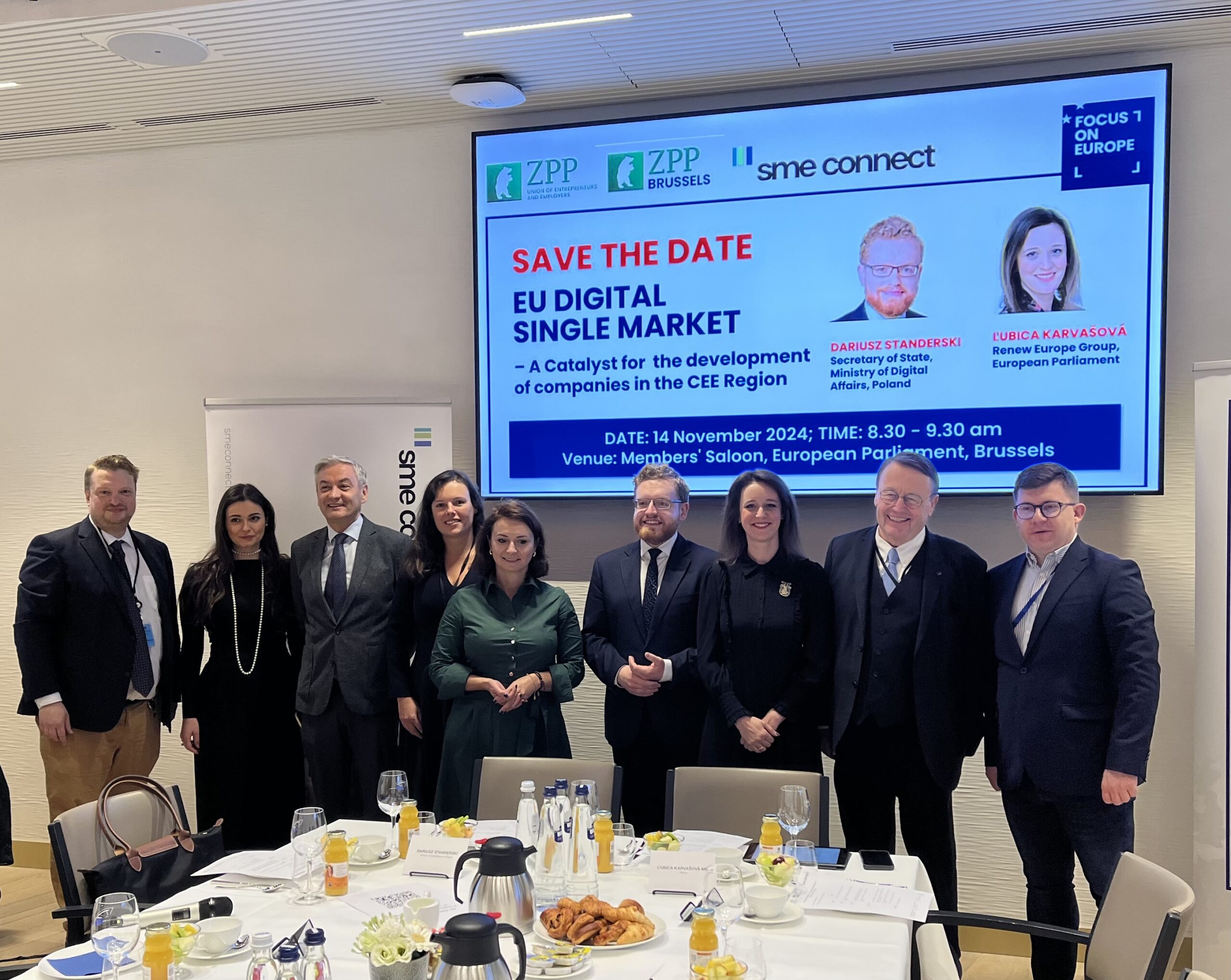From Potential to Progress:
Strengthening the CEE Region’s Digital Economy

On Thursday, 14 November, SME Connect co-organised together with Union of Entrepreneurs and Employers (ZPP) a roundtable event titled “From Potential to Progress: Strengthening the CEE Region’s Digital Economy”, taking place in the European Parliament in Brussels. The event was hosted by ĽUBICA KARVAŠOVÁ MEP, Vice-Chair of the Committee on Regional Development. The panel featured experts including DARIUSZ STANDERSKI from Ministry of Digitalisation of Poland; KAMILA GASIUK-PIHOWICZ MEP, Vice-Chair Committee on the Internal Market and Consumer Protection; AGATA BOUTANOS, Director of the Representation to the European Union of the Union of Entrepreneurs and Employers (ZPP); LUSYNE KESZISZJAN, Public Affairs Manager at the European Enterprise Alliance; RAFAL KAMINSKI, Advisor to Kosma Złotowski MEP; JAKUB BIŃKOWSKI, Board Member at Union of Entrepreneurs and Employers (ZPP); ANNA MAZUR, EU Regulatory Affairs Manager at Allegro. The event was moderated by DR. HORST HEITZ, Chair of the Steering Committee of SME Connect.
LUSYNE KESZISZJAN presented key findings from a new report on the Digital Single Market, highlighting e-commerce growth and challenges, particularly in Central and Eastern Europe (CEE). She noted significant growth in cross-border sales, driven by COVID-19, with countries like Poland (+55%) and the Czech Republic (+38%) showing strong increases. Mobile commerce has also surged, supported by high internet penetration. She addressed major challenges, including high delivery costs, VAT complexities costing SMEs €2.3 billion annually, and compliance burdens from consumer protection laws. Disparities in cross-border parcel tariffs and tariff-free advantages for Chinese imports under €150 also hinder fair competition. Lusyne stressed the need for uniform implementation of existing EU regulations to support SMEs and improve cross-border trade. She encouraged attendees to explore the report for detailed insights and recommendations.
ĽUBICA KARVAŠOVÁ MEP welcomed attendees and noted ongoing uncertainty about the European Commission’s composition, contrasting it with the swift government formation in the U.S. She emphasized the importance of competitiveness, both internally in completing the single market—where e-commerce has shown resilience—and externally in balancing trade with economic security. Highlighting the new economic security portfolio, she stressed the need for collaboration with businesses to ensure global competitiveness while protecting EU interests.
DARIUSZ STANDERSKI emphasized the urgency of addressing digital single market challenges as Poland prepares for its EU presidency. He highlighted the burdens of fragmented administrative and tax systems, which deter businesses from expanding within the EU, and prioritized harmonized implementation of digital laws, particularly the AI Act. Mr. Standerski outlined plans for workshops on regulatory alignment, investment strategies, and infrastructure development, with a strong focus on cybersecurity and AI. He stressed the need for resilient systems in critical sectors and coordination between EU and national levels. Poland’s presidency will aim to lay the groundwork for a unified digital single market and robust technology management strategies.
KAMILA GASIUK-PIHOWICZ MEP, emphasized the importance of addressing the digital single market from a regional perspective to remove barriers, improve digital skills, and ensure a level playing field for businesses. She highlighted Poland’s growth in e-commerce, noting it as a leader in Central and Eastern Europe, with 150,000 companies selling goods online and online shopping adoption rates doubling post-pandemic. She raised concerns about competition from Chinese e- commerce platforms like AliExpress and Temu, which dominate through low prices and often bypass EU safety and compliance standards. For example, 80% of tested toys from Chinese platforms failed to meet EU safety standards. With 85% of e-commerce parcels entering the EU daily coming from China, she stressed that European SMEs cannot compete in such a distorted market. To address this, she proposed three key actions: urgent abolition of the €150 VAT exemption for low-value goods; increased enforcement resources for EU digital laws and faster investigations; a Digital Fairness Act to address manipulative platform practices while simplifying regulations.
RAFAL KAMINSKI emphasized the importance of leveraging the digital single market as a key opportunity for Central and Eastern Europe. He highlighted the challenges of over-regulation potentially hindering SMEs and economic growth while recognizing the critical role of digital tools, including AI, in enabling SMEs to compete across all EU member states.He noted the low uptake of EU digitization funds among SMEs and stressed the need for targeted support to help them utilize digitalization to optimize costs and expand their reach. Rafal expressed concern about balancing effective regulation with economic growth, criticizing the overemphasis on rules over practical implementation in recent years. He called for a focus on realistic implementation of digital laws, particularly the AI Act, addressing gaps in public administration capacity to meet regulatory requirements.
ANNA MAZUR, representing Allegro, shared her company’s journey as Poland’s leading e- commerce platform. Allegro has expanded its services beyond a marketplace to include fintech and advertising solutions and has recently grown internationally in the CEE region. Anna emphasized the importance of ensuring that the EU’s intense legislative cycle for the tech industry translates into effective implementation on the ground. She highlighted the need to transform the fragmented regulatory system into a cohesive ecosystem and called for faster enforcement actions. Addressing systemic risks in e-commerce promptly is critical, she noted, to foster fair competition and strengthen the digital market.
JAKUB BIŃKOWSKI emphasized several key issues for the European e-commerce sector. He highlighted the importance of cohesive and consistent implementation of digital regulations across the EU, noting that inconsistent compliance requirements in each country impose significant financial burdens on businesses. Jakub stressed the necessity of ensuring a level playing field, particularly given the growing presence of Chinese platforms in Europe. He outlined three key concerns: unfair competition due to direct state support for Chinese platforms, ethical issues like forced and child labor, and security risks, including data privacy and the influence of authoritarian regimes. He also warned of attempts by Chinese companies to influence policymaking in Europe, including cybersecurity and e-commerce regulations. He concluded by urging regulators and organizations to remain vigilant about their partnerships and ensure they responsibly advocate for fair and secure digital market.